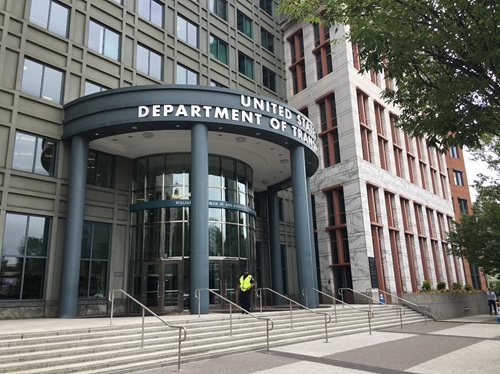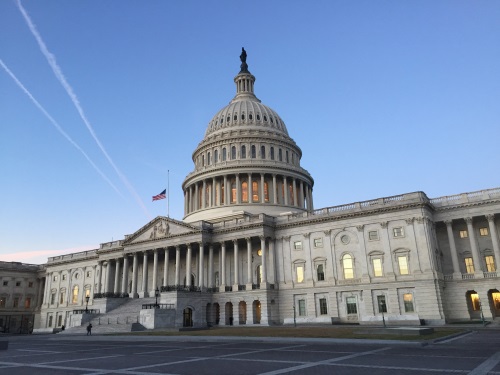A joint infrastructure funding framework issued by three House of Representatives committee chairs on January 29 seeks to invest $760 billion over five years on the nation’s roads, bridges, transit systems, railways, airports, ports, inland waterways, brownfield clean-up, broadband internet installation, plus wastewater and drinking water systems.
There are no “pay-fors” identified for the transportation spending increases, nor the overall spending package, and the proposal also seeks to expand local control of federal infrastructure funds and reduce state department of transportation flexibility.

Still, Jim Tymon (seen at right testifying before Congress), executive director of the American Association of State Highway and Transportation Officials, said the proposal is an important “first step” toward addressing the nation’s transportation needs as it would authorize $319 billion for highway investments and $105 billion for transit systems within that $760 billion five-year funding plan.
“It is our hope that the next step in this process results in a bipartisan transportation funding package; one that enacts a long-term, sustainable revenue solution for the Highway Trust Fund as well as increases and prioritize formula-based federal funding,” Tymon said in a statement.

In particular, the framework – put forth by Rep. Peter DeFazio, D-Ore., chair of the Transportation and Infrastructure committee; Rep. Frank Pallone, D-N.J., chair of the Energy and Commerce committee; and Rep. Richard Neal, Ways and Means committee chair – focuses on bringing existing infrastructure into a “state of good repair” while enabling the completion of critical projects. It also makes combating climate change a central tenet of any infrastructure investment efforts, noted Rep. DeFazio in a statement.
Meanwhile, Republican leadership of the House T&I committee issued its own set of transportation infrastructure principles on January 28; principles that Ranking Member Rep. Sam Graves, R-Mo., said he hopes to integrate into any final legislative package.

“Infrastructure remains an issue on which Congress can get something done, and that’s what our constituents expect us to do,” Rep. Graves explained in a statement. “Republicans stand ready to work with our Democratic colleagues to pass a bill that can earn bipartisan support and the President’s signature. We hope that Republican principles will be incorporated into a surface transportation bill because a bipartisan bill is the proven blueprint to getting a bill signed into law and that is what both Republicans and Democrats want.”
“I may not agree with all of the principles in the majority’s outline, but as the Republican leader of this committee, I expect to play a constructive role in the development of infrastructure bills before us this year, including expected surface transportation and water resources legislation,” Rep. Graves added in a separate statement. “On this committee, we know the recipe for success in addressing America’s infrastructure needs is through partnership, so let’s get to work.”

Concurrent with the Democrats broad infrastructure investment effort, four House members unveiled the Bridge Investment Act on January 30; a bill that would pump $20 billion into repairing 47,000-plus structurally-deficient bridges across the country over a five-year period while streamlining the bridge repair process via a competitive grant program.
The bill’s sponsors – Rep. Darin LaHood, R-Ill., and Rep. Earl Blumenauer, D-Ore., who serve on the House Ways and Means committee, along with Rep. Garret Graves, R-La., and Rep. Sean Patrick Maloney, D-N.Y., who serve on the House T&I committee – are seeking to have it included in any upcoming transportation funding legislation.
“I look forward to supporting this bipartisan provision in the upcoming reauthorization of our highway and surface transportation programs,” Rep. Garret Graves said in a statement.
 Top Stories
Top Stories
USDOT Issues $1B in Local Road Safety Funding
January 2, 2026 Top Stories
Top Stories

